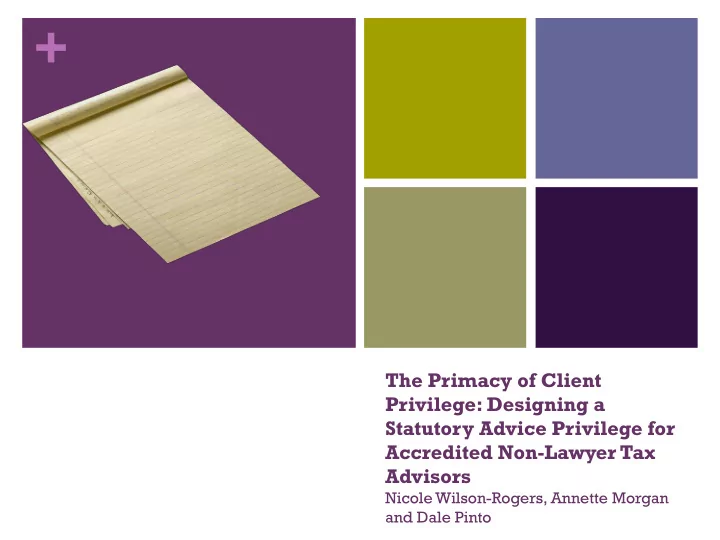

+ The Primacy of Client Privilege: Designing a Statutory Advice Privilege for Accredited Non-Lawyer Tax Advisors Nicole Wilson-Rogers, Annette Morgan and Dale Pinto
+ Structure Snapshot: Argument advanced in the paper Current Privileges Policy justifications for and against extending privilege to NLTAs? Design Considerations A potential model
+ Snapshot of the Paper Paper argues in favour of the enactment of a separate statutory advice privilege in Australia for accredited NLTAs
+ Current Position Several professional groups provide tax advice in Australia: lawyers, accountants, financial advisors, superannuation providers and registered tax agents. Do not enjoy equivalent privileges to provide such advice. Lawyers enjoy LPP over confidential tax advice, NLTAs accountants’ concession over limited documents.
+ Accountants’ Concession NLTAs - administrative concession extended by the ATO to certain tax advice documents between taxpayers and their professional accounting advisers. Documents that attract the concession are restricted source and non- source documents. Restricted source documents contain advice created prior to, or contemporaneously with, the transaction entered into by a taxpayer. Non-source documents contain written advice prepared after a transaction is complete, that do not affect the recording of the transaction in the taxpayer’s accounts or tax returns. Does not cover source documents which are documents that record a transaction or an arrangement entered into by a taxpayer (such as financial accounts or tax returns). The ATO currently has full access to these documents.
+ Accountants Concession Not self executing must be claimed ATO can lift in exceptional circumstances Exceptional circumstances include: Where the ATO believes fraud, tax avoidance, evasion or another illegal tax offence has taken place; and Where the ATO needs the documents to ascertain material facts necessary to determine the taxation consequences of the transaction, because the taxpayer or their records cannot be located.
+ Accountants Concession - Criticisms “broad and ill-defined; Works “one way” only and doesn’t provide confidentiality in relation to a clients’ communications to their accountants or notes made by a client; Potential application of Part IVA constitutes an exceptional circumstance; Argued that the ATO does not administer and interpret the concession in a transparent and consistent manner .
+ Review of the Concession Review of the Concession 2008 ALRC – Privilege in Perspective: Client Legal Privilege in Federal Investigations Recommended a statutory tax advice privilege be created whereby taxpayers would not have to disclose confidential tax advice document to the ATO when prepared by an independent registered tax agent for the dominant purpose of providing the taxpayer with advice regarding the operation and effect of tax law Based on partial adoption of the NZ statutory model 2011 Treasury - Privilege in relation to tax advice Public views on the establishment and appropriateness of tax advice privilege for NLTA’s
+ Policy justifications for and against the enactment of a privilege for NLTAs Why lawyers exclusively Specialised position – duty to the Court, training and regulatory framework Regina (Prudential plc and another) v Special Commissioner of Income Tax and another (Institute of Chartered Accountants in England and Wales and others intervening), the Court refused to extend LPP to accountants.
+ Why extend to NLTAs? Both lawyers and accountants provide legal advice in relation to taxation Encourages candour between taxpayers and their advisors Reduce inequity and compliance costs Equivalent penalties
+ Key issues and practical design considerations in developing a privilege for NLTAs What agencies should the privilege Safeguards apply against? Procedural Issues Type of advice? Stand alone or linked? Scope
+ Questions to be determined Scope: The first essential design consideration is determining what group of NLTAs the privilege should extend to? This involves determining contentious issues such as should the privilege be extended to all NLTAs or a sub-set of NLTAs such as registered tax agents, CAs, CTAs, IPAs or CPAs? Stand Alone or Linked Privilege: Linked to common law LPP or enacted as a discrete statutory stand-alone privilege? Type of advice covered? What type of advice should be covered. Should tax contextual information, business, international tax and oral advice be covered?
+ Questions to be determined Procedural Issues. Including should: the privilege only be triggered by a request? a time limit be imposed on when the privilege can be claimed? the privilege be susceptible to waiver? privilege be claimed by the NLTA or the client. Safeguards sanctions to ensure the privilege is not misused by deliberately claiming privilege to prevent access or making unfounded privilege claims.
+ Questions to be determined Which Agencies? ATO exclusively? ASIC, ACC or the various State Revenue Offices or private litigants.
+ Proposed Model Separate statutory advice privilege in Australia for accredited NLTAs. Integrated with registration of a tax agent by the Tax Practitioners Board . Separate accreditation process to provide appropriately credentialed tax agents with the ability and appropriate training to provide privileged legal taxation advice . Precondition to eligibility for registration to provide privileged tax advice would be existing registration as a tax agent.
+ Further Conditions Three further conditions: Postgraduate qualification in taxation (for example a Masters of Taxation or equivalent) or designation as a Chartered Tax Adviser , Certified Practising Accountant, Chartered Accountant or a member of the Institute of Public Accountants. Undertaking comprehensive competency training in the law of privilege. Engaging in ongoing continued professional education in the law of privilege.
+ Accreditation to provide privileged advice Possession of a relevant postgraduate qualification in taxation or professional Competency Training in Registration as a tax agent designation LPP Eg CA, CPA, CTA or IPA Accreditation to provide Privileged tax advice (Registration subject to maintaining ongoing CPD requirements)
Recommend
More recommend